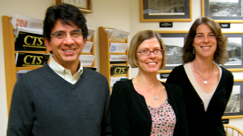
By Steve Tokar
Why do medical research findings often fail to reach the people who could benefit from them most? And why are health programs proven to work in one setting frequently unable to achieve success in other places? These and other questions are the focus of Implementation Science, a field of study that addresses the wide-ranging challenges of translating research knowledge into real-life practice.
“Implementation science is a relatively new way of describing efforts to improve health by taking advantage of proven, though often underutilized, health interventions and thoughtfully and creatively applying them for general use,” said Ralph Gonzales, MD, a professor in the UCSF School of Medicine, and director of the Implementation Science (ImS) program at the University’s Clinical and Translational Science Institute (CTSI).
In practice, implementation science covers diverse activities, including working to change behaviors such as ensuring that clinicians wash their hands regularly, improving care in hospital delivery rooms, and collaborating with community groups to promote disease prevention through youth-focused activities, said Margaret Handley, PhD, MPH, co-director of the ImS program. It may also focus on research in environments defined by complex variables, such as tracking and treating tuberculosis in developing countries, helping women make informed decisions about reproductive health, or linking with community-engaged research.
According to Gonzales, as more researchers learn about implementation science, it’s not uncommon to hear comments similar to, “Haven’t researchers been doing this all along in areas such as applied science and public health?”
There’s more to implementation science, he said. ImS applies theories and principles from diverse fields—economics, behavioral and social sciences, public health, marketing, public policy—and is inherently multidisciplinary. For researchers with years of training in a medical specialty, collaborating with diverse colleagues is not as common, nor as simple, as people might think.
Read more at UCSF.edu
Related stories:
Tracking and Treating Tuberculosis in Developing Countries
Helping Women Make Informed Decisions About Reproductive Health
Implementation Science Q & A With Program Director Ralph Gonzales
